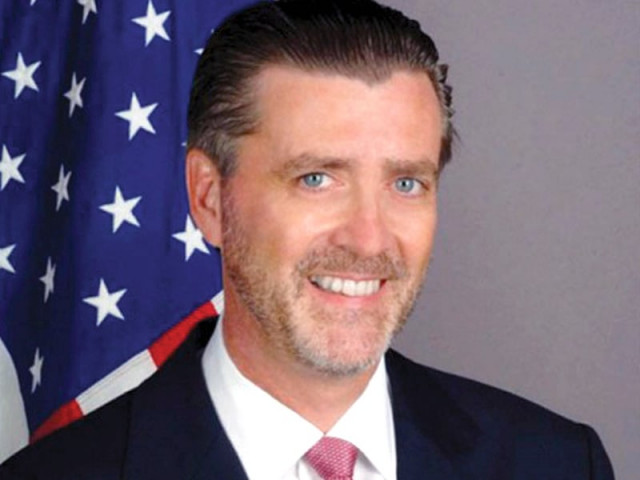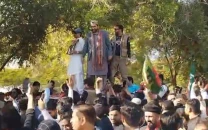Islamabad’s role vital for Afghan peace: Olson
Says Pakistan worked with US against al Qaeda.

PHOTO: STATE.GOV
“Following significant improvement after the election of President [Ashraf] Ghani, relations between Afghanistan and Pakistan have peaked and troughed over the past year in part due to critical issues, including refugees, border management, and counterterrorism,” US Special Representative for Afghanistan and Pakistan Richard Olson told members of the Senate Foreign Relations Committee during a Congressional hearing on Afghanistan on Thursday.
Kabul’s belligerent rhetoric not in regional interest: Maleeha
However, he noted that “while international support for Afghanistan remains strong, regional support continues to be filtered through complex national priorities”.
“Despite greater regional cooperation overall, regional players continue to hedge so long as they have doubts about the viability of the Afghan state. We continue to support Afghanistan as it works to improve relations with its neighbours and near-neighbours, promoting broader regional stability.”

Olson told the committee that there have been some encouraging signs of progress in recent months. After a meeting in June between Afghan Foreign Minister Rabbani and Pakistani Adviser on Foreign Affairs Aziz, both sides agreed to coordinate at senior and tactical levels on border management issues.
“We support this mechanism and believe that more bilateral dialogue between Afghanistan and Pakistan will increase prospects for mutual understanding, regional peace and stability.”
Olson said: “Pakistan’s military operations in the Federally-Administered Tribal Areas remain important.”
“The Pakistani military has made progress in shutting down terrorist safe havens through Operation Zarb-e-Azb and most recently in Operation Khyber III in the Rajgal Valley of Khyber Agency, with the aim to restore security to parts of Pakistan that have been used as terrorist safe havens for years.”
The US representative also noted that Pakistan has worked with the US to decimate core al-Qaeda.
“While the progress Pakistan has made through its recent operations is laudable, its struggle with terrorism will not come to an end until it makes a decisive shift in its policy of tolerance towards externally-focused groups.
“US officials have been very clear with the most senior Pakistani leadership that Pakistan must target all militant groups without discrimination -- including those that target Pakistan’s neighbours -- and close all safe havens.”
Ex-Afghan leader attacks new US combat rules, urges Taliban to talk peace
He said Pakistan’s leaders have assured of the US of “their intention to do so”.
In this regard, Olson welcomed Chief of Army Staff General Raheel Sharif’s statement on July 6, in which he directed Pakistani military commanders, intelligence agencies, and law-enforcement agencies to take concrete measures to deny any militant group safe haven or the use of Pakistani soil to launch terrorist attacks in Afghanistan.
“Pakistan has also played a critical role in generously hosting 1.5 million Afghan refugees for nearly 40 years. Pakistan’s contributions in this regard have been essential to providing asylum space for Afghans displaced by conflict and in furthering our goal of long-term peace and stability in the region.
“Pakistan should continue to uphold humanitarian principles and respect the principle of voluntary return, as outlined in the Solutions Strategy for Afghan Refugees.”
Published in The Express Tribune, September 16th, 2016.



















COMMENTS
Comments are moderated and generally will be posted if they are on-topic and not abusive.
For more information, please see our Comments FAQ